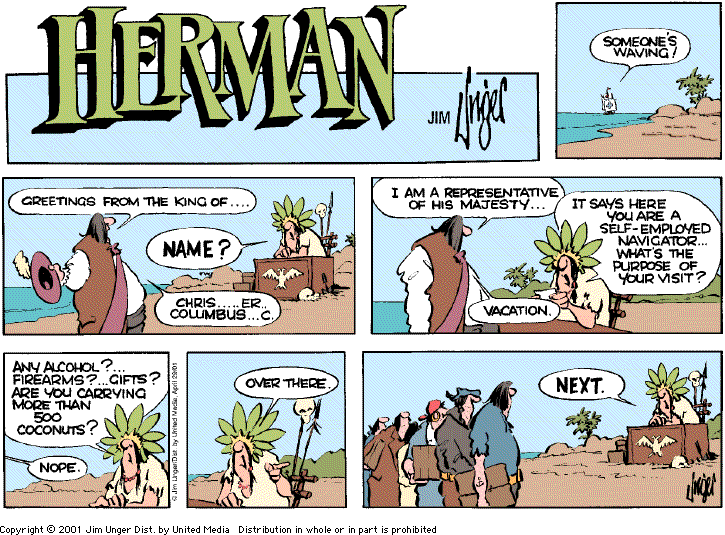By Electa Draper
The county's institutional memory on the issue dates to at least 2005, county spokeswoman Kris Friel said.
"I took an old press release about office closures and copied it for this year," Friel said apologetically. "There was not political will behind it. It was a cut and paste."
However, in other places, there is significant political will—and history—behind celebrating or not celebrating Columbus Day and calling it or not calling it Columbus Day.
"Calling it 'Discovery Day' just makes things worse," said Native American activist Suzan Shown Harjo. "We weren't discovered. Columbus was lost. He did lurch upon our shores, but he thought he was in India."
Perhaps the nation should commemorate this undeniably momentous event in history by using a neutral name, she said.
Harjo said she tried out and rejected a few possibilities, such as "Day That Inevitably Led to European Invasion of the Western Continents to Extract Gold."
"Culture Clash Day" is pithier.
Christopher Columbus, who never set foot on the land that would become the continental United States, nevertheless brought Western Hemisphere land masses to the attention of Europeans.
His arrival over here in 1492 is marked throughout the hemisphere, from northern North America, where Vikings likely preceded him, to Tierra del Fuego in South America. In many countries, such as the Bahamas, Hispaniola and Colombia, the day Columbus landed is called Discovery Day.
Some of these countries have non-white majorities, but they still celebrate Discovery Day? That's a good example of how white privilege can dominate a country even when whites aren't a majority.
Naturally I'd prefer to celebrate October 12 as Native American Day, but I wouldn't say that's neutral. If we want to commemorate the event with a neutral label, it would have to be something like "First Contact Day" or "East-West Day."
For my fair and balanced take on the subject, see This Ain't No Party, This Ain't No Disco: A Columbus Day Rant.
P.S. A slight correction to this article's title. "Columbus Day" is pithier than any of the alternatives, since it has fewer letters and syllables.


5 comments:
""We weren't discovered. Columbus was lost."
I never bought into that logic. After all, many things are discovered when explorers or scientists are lost.
But "Discovery Day" changes a commemoration of a Pol Pot-level mass murderer to a rather one-sided description of this event.
On this day, the Natives, after all, discovered nothing. Excent for Columbus, really, and that is not worth celebrating.
"it would have to be something like "First Contact Day" or "East-West Day.""
Trekkies would love the first one. Come to think of it, if there is anything in America that still needs its own holiday, it is Star Trek. The second one makes me think of a conference celebrating trade between the US and East Asian nations.
A response to this item on Facebook:
Linde Knighton: I think Explorer Day, to honor or tell the truth about all explorers, from every field, including science, art, music, etc., from every culture, as a school holiday, where schools are open to study these people, as well as libraries, complete with programs on everyone from astronauts to Steven Hawking would be the best solution.
Maybe, Linde, but then the day wouldn't have much to do with Columbus. I'm trying to think of a name for a day commemorating the first encounter between Europeans and Indians. I'm open to suggestions.
Linde's suggestion of making it into "Explorer Day" really leaves it as a weakened "Columbus Day" doesn't it? After all, who is the first explorer that most people will think of.
I agree about "Explorer Day."
Yes, people can discover things while they're lost or seeking something else. But I think Harjo's comment is shorthand for several ideas. Among them:
1) There was nothing to "discover," since Natives already inhabited the land. Moreover, the Vikings knew about North America.
2) Columbus never thought he had "discovered" anything. Until his dying day he believed he had reached islands off the coast of Asia.
Can we really give Columbus credit for "discovering" America if he didn't discover it first, he didn't intend to discover it, and he didn't realize he discovered it? I don't think so.
Post a Comment